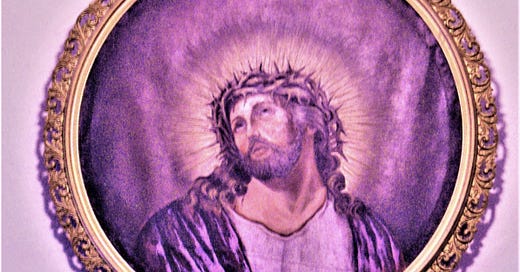Have you cried lately? Political attacks on religious faith beg a good cry.
Wait, wait—this isn’t a sermon. Nonbelievers are safe here. One needn’t endorse God to appreciate how egregiously wrong it is to persecute belief in deity, or to belittle meditators in general. It is not a good look for persecutors.
People of faith simply refuse to live their lives within a three-dimensional physical, emotional, and intellectual construct. They add to the mix a fourth dimension—spiritual, which can enhance and vitalize the other three. Any real writer ought to recognize the active agent involved here. Call it… muse.
The principal character in Willa Cather’s celebrated Death Comes for the Archbishop speaks of the enhancement this way: “Miracles... seem to me to rest not so much upon... healing power coming suddenly near us from afar but upon our perceptions being made finer, so that, for a moment, our eyes can see and our ears can hear what is there around us always.”
The described illuminating insight—coupled with compassion and humility—turns ordinary men and women into extraordinary parents, neighbors, and citizens. They see and hear “what is there around us always,” getting fuller value from their daily existence and passing it on.
For their faith, they are treated shabbily. That has been so from the beginning. Something about people turning the other cheek, or loving God more than, say, Bernie Sanders or Confucius, seems to enrage some nonbelievers.
So, we have Christians in Africa and Asia, Falun Gong adherents in China, and Muslims in India being harassed, sometimes to death. It usually is strident sectarian authorities doing the silencing and killing, but in some situations it’s one brand of believers violently repressing their rivals. That’s doubly saddening—and atheists and agnostics decry the incongruity.
It’s true: Pogroms and religious genocide sometimes are orchestrated by self-declared God-worshipping people. It happens when religion is politicized and the state becomes an arm of the sacred. Such a union always is unholy, whether we’re talking Roman crusades, the Muslim slaughter of infidels, or Puritan witch-hunters.
Yet the intrinsic problem there is politics, not religion. Faith intrinsically is inward-facing and people are free—in some societies, anyway—to believe what they want to believe. They can worship quietly in pews or loudly from basketball court-side seats, sing praises for God’s mercy or doom-cry about climate change. Devotion is not a problem. To each his own.
It’s when belief is politically codified that it takes wing and, screeching, swoops down on nonbelievers with talons extended. Hell hath no fury like a fervent power-wielder angered by the sight of alternative devotion.
The truth is, anyone harboring hope for a better tomorrow ought to identify with people who reach for the divine. Believers in God are onto something. They are finding order in a fractious existence, meaning in day-to-day living, and personal worth in an impersonal world. Which is to say, they’re finding peace. Only hostile hearts feel threatened by such.




